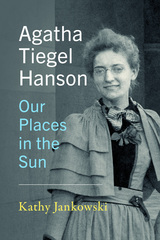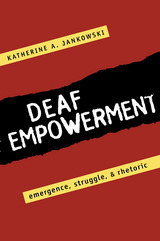2 books about Jankowski, Kathy

Agatha Tiegel Hanson
Our Places in the Sun
Kathy Jankowski
Gallaudet University Press, 2023
Agatha Tiegel Hanson (1873-1959) is regarded as a seminal figure in Deaf history for her writing, advocacy, and leadership, though her accomplishments merit recognition within the larger context of American history as well. Barely fifteen years old in 1888, Tiegel Hanson became one of the first women to attend the nation's only college for Deaf students, the National Deaf-Mute College, now known as Gallaudet University. Amid the hostility and skepticism of male students and faculty, she achieved exemplary academic success and was the first woman to earn a Bachelor of Arts degree from the college. Upon facing stringent campus restrictions and exclusion from male-only organizations and activities, Tiegel Hanson cofounded a society for female students. Her prerequisite graduation presentation, "The Intellect of Woman," was a powerful oratory that urged women to “move on till all barriers crumble and fall.”
Throughout her life, Agatha Tiegel Hanson worked to advance the rights of Deaf people and women, and she was a passionate advocate of sign language rights. Her contributions include creative written works as well as influential treatises. She served in leadership positions at several Deaf organizations and, along with her husband, noted Deaf architect Olof Hanson, she played a vital role in the Deaf cultural life of the time. In Agatha Tiegel Hanson: Our Places in the Sun, author Kathy Jankowski presents a portrait of this trailblazer, and celebrates her impact on the Deaf community and beyond. This biography will be of interest to those already familiar with Tiegel Hanson’s legacy as well as to readers who are discovering her extraordinary life for the first time.
Throughout her life, Agatha Tiegel Hanson worked to advance the rights of Deaf people and women, and she was a passionate advocate of sign language rights. Her contributions include creative written works as well as influential treatises. She served in leadership positions at several Deaf organizations and, along with her husband, noted Deaf architect Olof Hanson, she played a vital role in the Deaf cultural life of the time. In Agatha Tiegel Hanson: Our Places in the Sun, author Kathy Jankowski presents a portrait of this trailblazer, and celebrates her impact on the Deaf community and beyond. This biography will be of interest to those already familiar with Tiegel Hanson’s legacy as well as to readers who are discovering her extraordinary life for the first time.
[more]

Deaf Empowerment
Emergence, Struggle, and Rhetoric
Kathy Jankowski
Gallaudet University Press, 1997
Employing the methodology successfully used to explore other social movements in America, this meticulous study examines the rhetorical foundation that motivated Deaf people to work for social change during the past two centuries. In clear, concise prose, Jankowski begins by explaining her use of the term social movement in relation to the desire for change among Deaf people and analyzes the rhetoric they used, not limited to spoken language, to galvanize effective action.
Central to Deaf Empowerment is the struggle between the dominant hearing society and Deaf people over the best means of communication, with the educational setting as the constant battleground. This evocative work first tracks the history of interaction between these two factions, highlighting the speaking majority’s desire to compel Deaf people to conform to “the human sciences” conventionality by learning speech. Then, it sharply focuses on the development of the Deaf social movement's ideology to seek general recognition of sign language as a valid cultural variation. Also, the influence of social movements of the 60s and 70s is examined in relation to the changing context and perception of the Deaf movement, as well as to its rhetorical refinement.
Central to Deaf Empowerment is the struggle between the dominant hearing society and Deaf people over the best means of communication, with the educational setting as the constant battleground. This evocative work first tracks the history of interaction between these two factions, highlighting the speaking majority’s desire to compel Deaf people to conform to “the human sciences” conventionality by learning speech. Then, it sharply focuses on the development of the Deaf social movement's ideology to seek general recognition of sign language as a valid cultural variation. Also, the influence of social movements of the 60s and 70s is examined in relation to the changing context and perception of the Deaf movement, as well as to its rhetorical refinement.
Deaf Empowerment delineates the apex of effective Deaf rhetoric in describing the success of the Deaf President Now! protest at Gallaudet University in 1988, its aftermath, and ensuing strategies. It concludes with an assessment of the goal of a multicultural society and offers suggestions for community building through a new humanitarianism. Scholars of social movements and Deaf studies will find it to be a uniquely provocative addition to their libraries and classrooms.
[more]
READERS
Browse our collection.
PUBLISHERS
See BiblioVault's publisher services.
STUDENT SERVICES
Files for college accessibility offices.
UChicago Accessibility Resources
home | accessibility | search | about | contact us
BiblioVault ® 2001 - 2024
The University of Chicago Press









